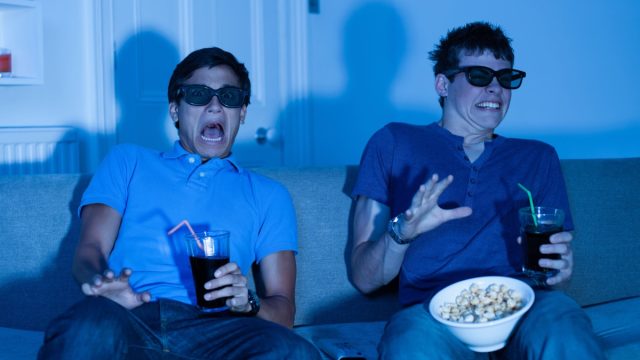The Real Reason You Can't Help But Love Scary Movies
You get the adrenaline, but not the anxiety.

Halloween is just a few days away, and you know what that means: it's time for some scary movie marathons. But given that feeling scared is an unpleasant sensation you feel as though most of us would try to avoid in our day-to-day lives, you have to wonder what it is about human psychology that makes us want to watch something that's going to make us literally jump out of our seats in terror.
It turns out that, much like riding a roller coaster, scary movies enable us to experience a rush of adrenaline—but without any of the anxiety that comes from being in any real danger.
"The [brain] circuitry involved in any kind of excitement is overlapping, so you get that rush of adrenaline you feel when you do anything exciting," Arash Javanbakht, a psychiatrist and director of the Stress, Trauma and Anxiety Research and Clinical Program at Wayne State University in Detroit, told WebMD. "We need a balance between knowing we are safe and also being exposed to something terrifying."
The analogy that he uses is that of confronting a lion in the wild versus at the zoo. If you were in the jungle, coming face to face with this natural predator would make you seize up in a very unpleasant way. But, at the zoo, the protective bars let you know you're not actually going to get hurt. That's why when we get a little too into a horror film and start to feel like it's reality, we need to remind ourselves that it's actually just a movie.
Additionally, some of the satisfaction that we get from thrillers come from the oscillation between feeling comforted and terrified. A great horror series like The Haunting of Hill House, for example, will give you a great scare before lulling you into a feeling of security via extended scenes of family dialogue, which are inevitably followed by another scare.
For that reason, not all scary movies are made equal. For a thriller to really work, you need to be able to empathize with the victim and feel like this is something that could happen to you. That's why Javanbakht said that while he's essentially bored by zombie movies, films like The Exorcist have more of an emotional effect, because they lead him to think, "That was happening in a bedroom, and now I'm in my bedroom, so who knows what could happen?"
It's also why The Ring works so much better than, say, I Know What You Did Last Summer. In the latter, the fear factor is diminished by the understanding that, if you were in the same situation, you'd probably have enough sense to run out of the house when confronted by a mass murderer rather than into the attic. In The Ring, however, everyone can relate to the idea that if you happened to find a blank VHS tape, your curiosity would compel you to see what was on it, and your fate would be sealed.
Human beings are also drawn to scary movies for the same reason that we're drawn to roadside accidents, because they provide us with a sense of escapism.
"Halloween and scary movies, scaring people and being scared, is not boring," NYC psychologist Linda Hamilton told The LA Times. "We are attracted to doing things that are unusual."
Again, however, there's a delicate balance at play here. While you need to be able to empathize with the victims in the film, you also need to not empathize with them too much. That's why some people enjoy slasher movies and others need to look away, because the experience of watching someone get their throat cut is just way too disturbing.
According to Glenn Sparks, a professor and associate head of the Brian Lamb School of Communication at Purdue University, people who have a hard time blocking out unwanted stimuli and tend to be hypersensitive about things like the temperature of a room or the tag on their shirt are also more likely to have an unfavorable psychological reaction to these kinds of films.
It's also interesting to note that men tend to like scary movies more than women, and one study even found that men will enjoy the movie more when watching it in the presence of woman who is scared. It's sexist, yes, but psychologists believe this is due to the fact that the scenario enables men to feel strong, brave, and masculine, and enjoy the experience of comforting the woman—a phenomenon known as "the cuddle effect."
And if you're looking for some inspiration for your scary movie night, check out the 40 Best Horror Movies for Totally Freaking Yourself Out.
To discover more amazing secrets about living your best life, click here to sign up for our FREE daily newsletter!





















